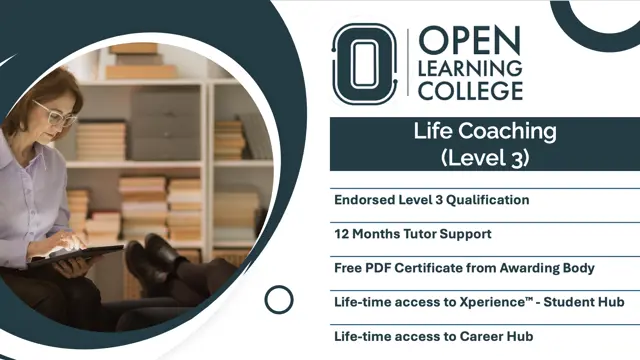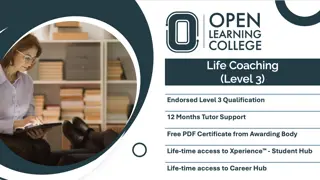
Life Coaching (Level 3) Diploma
Distance Learning Course, featuring tutor support and AI assistance, available online or as a study pack option.
Open Learning College
Summary
Funding options available on our website
- QLS & OPA - Free
- Exam(s) / assessment(s) is included in price
- Tutor is available to students
- TOTUM card included in price What's this?
Add to basket or enquire
Overview
Embark on a transformative learning journey with the UK’s most innovative home study provider, offering courses designed to unlock your true potential and facilitate the career change you desire. Access our distance learning courses directly from anywhere, anytime, and acquire industry-recognised Professional Qualifications essential for advancing in your career.
Specifically, explore the flexible and convenient Life Coaching (Level 3) course, an ideal way to gain a diploma qualification. Whether you aim for further education, improved job prospects, or expanded knowledge, this comprehensive course allows you to prepare thoroughly for exams or careers through home study. Plus, it’s structured to be accessible and beneficial even if you have no prior knowledge in Life Coaching.
This course is accepted by ACCPH at Level 3 and allows you to join as a professional member after graduation.
A life coach is an individual who helps and empowers others to create, meet and exceed personal and professional goals. These include being happy and fulfilled in personal life, excelling in the workplace and exploring ambitions as well as the self and the world. This Quality Assured Level 3 Diploma in Life Coaching course is designed for those wishing to work as a Life Coach, both on an individual and corporate basis. Throughout the course you will build on the skills you need to coach in a range of situations, and for a wide range of people.
This online life coaching course will also explore and develop your own strengths and show you how this can be implemented into your training and therefore into practising as a coach. The Open Learning College course is widely respected worldwide, and provides a first class training for prospective coaches.
Achievement
Certificates
QLS & OPA
Digital certificate - Included
Open Learning College have undergone external quality checks to ensure that the organisation and the courses’ it offers meet a high standard. Regular reviews of our courses are carried out as part of the endorsement process.
The course depth and study has been benchmarked at Level 3 against level descriptors published by Ofqual.
Visit www.qualitylicencescheme.co.uk for more information.
1. You will receive your accreditation directly from QLS, once you have successfully completed your course (certification fees are included in the course fee).
2. You will receive the Open Pathway Accreditation Diploma (OPA.dip) from Open Learning College.
Course media
Resources
- Life Coaching Level 3 (QLS) Course -
Description
Module 1: Life Coaching and You
This module explores the role of the coach in a wide-range of situations. The module encourages students to look introspectively and starts building the blocks of thinking about the numerous reasons people will seek a coach. The module also examines the various techniques of the delivery of coaching. It explains the differences in advice, guidance and the implementation of coaching. Students gain knowledge of active listening and personality profiling. Students are asked to review thoughts and feelings about certain situations, and then learn how to structure thoughts and plan personal development. Students are introduced to questioning techniques and building up a preliminary client session.
Module 2: Essential Qualities
This module focuses on the qualities that a Life Coach needs to possess and develop in order to be a positive influence on the client. This also addresses confidentiality and report taking. The module requires students to complete an interview form and to summarise case studies.
Module 3: Interviewing a Client and Neuro Linguistic Programming (NLP)
This module demonstrates to students how to build key client relationships, maintaining confidence and trust of clients, and delivering high quality services all the while managing client expectations. The interviewing technique is key to the successful coach and also enables the coach to see the client as a whole. Key techniques will be examined. These will be developed as the course progresses.
The NLP component of this module is a stand-alone course in itself. NLP brings together the three areas of the mind, our use of language, and our behaviour to achieve our goals. “Neuro” relates to neurology, the study of the mind and how we think, “linguistics” covers our use of language and how it affects us and “programming” addresses how we sequence our actions to achieved desired outcomes. The basic premise is that it useful and desirable for coaches to appreciate the nature and applications of NLP, particularly since there are strong links and similarities between many NLP concepts, strategies and techniques and others widely used in coaching. The Module adopts an objective, informative and questioning approach. It outlines the benefits of NLP in promoting positive thinking, effective communication, and encouragement to use one’s internal resources to “change one’s state” and achieve well-formed outcomes.
Module 4: Relationships, Sexuality and Bereavement
This module explores the techniques used to draw information out of the client and aid the coming to terms with how he or she feels. It also addresses coaching couples and examines the way the coach may approach the situation in a different manner. The module covers wide-ranging relationships from workplace to family. This module also discusses the stages of dying and the tasks of mourning. The coach can have a huge part to play in these situations. Many clients will benefit from a mourning plan and dealing with the vast array of emotions they may be feeling. Students cover perspectives of the reality of loss, the client adjusting to their environment, allowing for individual differences. Defences and coping styles are explained.
Module 5: Drugs, Alcohol, and Addictions
This module addresses the definitions and effects of drugs, alcohol and addictions. Students will gain knowledge and understanding of the effects with regard to relationships, physical and emotional health, aspects of performance as well as legal and financial situations. The module covers ways of assisting the client in a practical and supportive manner. The course also covers coaching clients with financial problems.
Module 6: Stress, Depression and Suicide
This module examines many of today’s largest problem areas that are encountered by clients. Students will have the opportunity to work through the detailed practical steps and goal setting processes that assist the client. The module explains healthy coping styles, relaxation techniques, stress management systems, sources of stress (stressors) and time management.
Module 7: Finding Clients and Initial Enquiries
This module explores the areas in which a coach works. Students will learn about coaching in specialised areas; eg. Health and Fitness Coach, Addictions Coach, Female Lifestyle Coach, Relationship Coach, Career Coach and Business Coach, as well as all round coaching. By this stage of your course, students may have definite ideas of specialising in a particular area of coaching. Students will also gain knowledge about promotion of themselves and their businesses, as well as dealing in a positive manner with prospective clients.
Module 8: Financial, Career and Workplace (Corporate) Coaching
This module focuses on the clients’ financial goals, using financial indicators and positive goal setting. Students will also gain understanding of coaching within the context of a person’s career and workplace which is one of the largest fields of interest for coaches.
Module 9: Business of Coaching, Administration and Ethics
This module contains samples of various coaching sheets. These include: coach/client contract, client session form, client basis form, client goal action form, referral letter, terms and conditions, client’s action plan/care plan and client feedback forms.
The final part to the full course is a ‘Plan for Business’. This is a full course and moves the student through a business plan, how to market important skills professionally, finance and the conflicting elements that may be encountered. This section of the course is especially relevant to those who aim to start their own private practice.
(Please click on the curriculum tab above to see a detailed view of each module)
Who is this course for?
Target Audience
- The Life Coaching course caters to aspiring life coaches, counselors, or individuals passionate about guiding others through personal growth and development.
- It's ideal for professionals in the counseling, psychology, or mentoring fields seeking to expand their skill set or transition into coaching.
- Moreover, it appeals to individuals enthusiastic about empowering others and making a positive impact by aiding in goal attainment, fostering self-awareness, and enhancing interpersonal skills.
- This program equips learners with the necessary tools and insights to support individuals striving for personal transformation and success in various aspects of life.
Requirements
Course Requirements
- The good news is that no prior learning knowledge or experience is essential to take this course. This course is openly available to anyone wishing to learn more about Life Coaching (Level 3) and would like to take part in a highly rewarding distance learning study course.
- We believe that everyone should have the opportunity to expand their knowledge and study further, so we try to keep our entry requirements to a minimum.
- You have the freedom to start the course at any time and continue your studies at your own pace for a period of up to 12 months from initial registration with full tutor support.
Career path
By empowering their clients, life coaches help them make decisions and changes to achieve their potential
Questions and answers
Reviews
Currently there are no reviews for this course. Be the first to leave a review.
Legal information
This course is advertised on reed.co.uk by the Course Provider, whose terms and conditions apply. Purchases are made directly from the Course Provider, and as such, content and materials are supplied by the Course Provider directly. Reed is acting as agent and not reseller in relation to this course. Reed's only responsibility is to facilitate your payment for the course. It is your responsibility to review and agree to the Course Provider's terms and conditions and satisfy yourself as to the suitability of the course you intend to purchase. Reed will not have any responsibility for the content of the course and/or associated materials.



